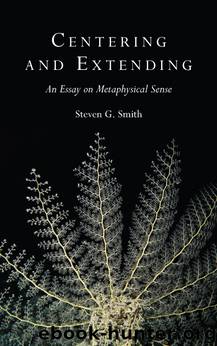Centering and Extending by Smith Steven G.;

Author:Smith, Steven G.; [Smith, Steven G.;]
Language: eng
Format: epub
ISBN: 9781438464237
Publisher: State University of New York Press
Published: 2017-01-15T07:00:00+00:00
Intentionality
“Intentionality” is an umbrella term for all forms of self-directedness of a being toward other beings, including intentional acts (perceiving, believing, desiring), intentional constructs (concepts, facts, values), and intentional statuses (“actual,” “justified,” “imperative”).
Naturalism most obviously threatens the intelligibility of intentionality when it turns away from the active constituting of the world to already-constituted states of affairs like physical objects or physical facts for its ontological benchmarks. Then the necessary intentional supposing of those objects and facts in the active present becomes invisible. More subtly, a broad naturalism may blur our view of intentionality by dumping intentional items without discrimination into an all-inclusive category (“natural complexes”) or setting them too much apart in a categorical ghetto of their own (“emergent properties”).
From the point of view of physicalist naturalism, intentional items such as feelings and meanings and judgments are queerly nonphysical in relation to paradigmatic physical existents, and so it must be decided whether to construe intentional items as aspects of physical existents or eliminate them altogether from enlightened reference. The challenge for a broader naturalism is to place intentional items in the scheme of being such that their necessary reciprocity with other sorts of real items is apparent.
Intentionality does not submit tamely to placement because its essence is placing. It consists of “meanings” in the active verbal sense, proposings of how beings are to be, centerings of the constitutive centerings of beings; its metaphysical base is centering in the active sense, occurring actually on the basis of already-enacted centering and with the possibility of prolongation or further development. Since centering and the possibility of further centering obtain wherever and whenever anything obtains, the world is thoroughly hospitable to life, perception, thought, and responsible relationship even if not uniformly alive, perceptive, thoughtful, or responsible. “Subjectivity” in its normal mental sense is a power of centering; in the broader logical sense in which being anything at all involves being a possible subject of predication and reference, centering and subjectivity are the same.
It may be thought impossible to assert so positively a metaphysical base for intentionality after Kant’s critique of metaphysics. For Kant showed that while the subjective centering of intelligible experience is epistemologically fundamental (contra naïve realism), it is also metaphysically unconfirmable (contra dogmatic idealism). We can know a priori that phenomena must conform to a synthetic rule of succession, for example, since without such a time-rule there could be no coherent experience of nature. The diachronic and synchronic centerings of time are therefore empirically real. But we cannot know the underlying real unfolding of thought and phenomena, since we cannot be perceptually affected by that reality except through the subjective formation of empirical time.3 The case is the same with the spatiality of things, the causal force and susceptibility of things, and even the thinghood of things and the psychological selfhood of the self. But the Kantian caution against seeking to know anything outside the reason-and-perception partnership that makes objective knowledge possible is not inconsistent with a metaphysical recognition of the necessary ubiquity of centering.
Download
This site does not store any files on its server. We only index and link to content provided by other sites. Please contact the content providers to delete copyright contents if any and email us, we'll remove relevant links or contents immediately.
The remains of the day by Kazuo Ishiguro(8828)
Tools of Titans by Timothy Ferriss(8224)
Giovanni's Room by James Baldwin(7199)
The Black Swan by Nassim Nicholas Taleb(7016)
Inner Engineering: A Yogi's Guide to Joy by Sadhguru(6728)
The Way of Zen by Alan W. Watts(6511)
Asking the Right Questions: A Guide to Critical Thinking by M. Neil Browne & Stuart M. Keeley(5651)
The Power of Now: A Guide to Spiritual Enlightenment by Eckhart Tolle(5610)
The Six Wives Of Henry VIII (WOMEN IN HISTORY) by Fraser Antonia(5398)
Astrophysics for People in a Hurry by Neil DeGrasse Tyson(5134)
Housekeeping by Marilynne Robinson(4349)
12 Rules for Life by Jordan B. Peterson(4250)
Double Down (Diary of a Wimpy Kid Book 11) by Jeff Kinney(4208)
The Ethical Slut by Janet W. Hardy(4178)
Skin in the Game by Nassim Nicholas Taleb(4165)
Ikigai by Héctor García & Francesc Miralles(4125)
The Art of Happiness by The Dalai Lama(4063)
Skin in the Game: Hidden Asymmetries in Daily Life by Nassim Nicholas Taleb(3935)
Walking by Henry David Thoreau(3897)
